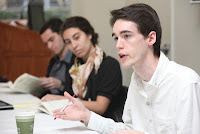By James J. Kempster
Stopping. Looking. Listening. Universities don’t often have time to do this. We find ourselves planning next year’s orientation before this year’s commencement is over, or next semester’s reading list before the start of the current one. Long-term and in-depth planning often take a backseat to immediate concerns, the symposium next week, or the term paper due tomorrow.
Much has happened behind the scenes this semester to prepare for a thorough redesign of Fordham’s website. The scope of this project will include a new design, a new user-centric navigation, and a new technical infrastructure that will make the site easier to maintain. While the new website is at least a year away, the current work is laying the groundwork for a strong, well-designed, easy-to-use service.
An endeavor of this size is massive, and to do it well, Fordham has needed to stop, look, and listen. We are nearing completion of an in-depth review of our current website, as well as the technology behind it, the staff allotted by the University to maintain content and technology, and the kind of Web services the University needs for the future. If you are not familiar with this project, you may learn more in my previous Fordham Notes post, “'Groundbreaking' a New Fordham Website,” here.
The Web Assessment Process
In March and April, the Web assessment team from mStoner met with several groups of faculty, students, and administrators on the Rose Hill and Lincoln Center campuses, to get a sense of the functionality that a new website should have, as well as how the Fordham experience should be represented on the Web. They met with nearly 200 representatives from admissions and enrollment groups, administration and faculty from the law, social service, business, and other graduate schools and the undergraduate schools, students, IT, alumni, marketing and advancement, and more. Further phone calls and videoconferences, as well as an online survey to be launched this week, have supplemented those meetings to offer the broadest possible participation to the Fordham community.
Survey
Invitations to participate in online surveys will go out this week to students, faculty, staff, and alumni. The survey should take no more than 10 minutes to complete, and focuses directly on the participant’s Web use and impressions of Fordham University. Those who participate in the survey will be entered into a raffle for a $50 gift certificate from Barnes & Noble.
The Bigger Picture
Additionally, the mStoner team has been reviewing and evaluating the current Fordham website and those of a number of competitor, aspirant, and peer schools, as well as reviewing reports, plans, admission collateral, and other materials. They have studied our website analytics, as well as the review of several new content managements systems that was conducted by Fordham’s information technology department last semester.
Next Steps
mStoner will present their full assessment of Fordham’s Web needs at the beginning of June. The report will include a timeline and process for the implementation of a comprehensive University website relaunch, as well as a summary of their examination of the current Fordham.edu and the websites of competitor, aspirant, and peer institutions. The report will also include details about the key messages for the new Fordham.edu and the means for conveying those messages, as well as a proposed website structure and navigation system, and content and design summaries.
From what mStoner has heard from the Fordham community, their preliminary recommendations will include the following:
• presenting a strong brand quickly and clearly;
• simplifying navigational paths, anticipating audience needs and delivering relevant information to them easily;
• capturing the beauty of campus and the Fordham experience;
• keeping information current;
• applying best practices in information architecture;
• offering better search, course listing, directory, calendar, content, and information sharing features, RSS and other syndication opportunities, analytics and content editor “tool kits;” and
• future-proofing the website for a range of devices and displays.
Sustainability
mStoner’s recommendations will also address the foundational technology, people, roles, process, and planning issues that Fordham University must tackle in order to create a compelling and sustainable website. They will include recommendations for staffing, training, and support during the project and after the launch, including these key criteria:
• an appropriately resourced Web communications team to implement the overall vision and functionality of the website;
• a decentralized model for Web authorship that clearly defines oversight and includes central training and support;
• commitment to continuous improvement and a model for governance; and
• best practices in design, publishing, editorial, and technology, which provide the ability to quickly publish new content.
We have so much to gain in doing this project correctly. That is why these months behinds the scenes in which we have taken the appropriate time to research, review, and assess Fordham’s needs, have been crucial.
James J. Kempster is the senior director of marketing and communications at Fordham.
Foundation 3.8: Deconstructing Constructs
-
I said last week that I thought episode 3.7 of *Foundation* might well have
been the best episode of the entire series so far. Episode 3.8 on Apple
TV...
4 hours ago














